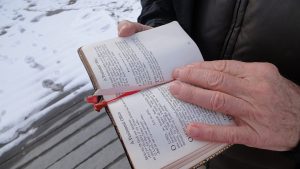The Book of Common Prayer: A Unifying Resource
Mark+ Walz
 I am a relatively new Anglican, but not as new to The Book of Common Prayer (BCP). There was a time in my ministry, when I was in a different denomination, when I found myself searching for material to perform formal ministerial functions for which my own extemporaneous prayers and thoughts seemed limiting and too personal. A graveside service? Where do I go to find how to do that? Someone told me to check out the BCP.
I am a relatively new Anglican, but not as new to The Book of Common Prayer (BCP). There was a time in my ministry, when I was in a different denomination, when I found myself searching for material to perform formal ministerial functions for which my own extemporaneous prayers and thoughts seemed limiting and too personal. A graveside service? Where do I go to find how to do that? Someone told me to check out the BCP.
It was easy enough to find the section on funeral services, and after using much of what I read, I got a copy of the BCP for myself and started utilizing the book for other important services (like weddings). I found the book to be beautiful in its poetry and centered around scripture. But for some reason it took me a long time before I started using it more often. I suppose I did not place enough value in it beyond those special occasions. I preferred the loose and more “spirit-led” experiences I was used to; maybe I thought I was being more genuine.
Fast forward a bit in my ministry and life: Today I use it for my family; I use it for personal study; and I use it for ministry—nearly every day, and sometimes several times a day, I am opening up the BCP. For my family, it provides rhythms to our life with Christ that I found difficult to establish beforehand. For personal study, specifically of the Scriptures, the book allows me to jump into time with God and His Word that does not require me to prepare anything. And if I am honest, I have at times been less than enthusiastic to read and study and pray each day. So, as one author wrote, “there have been times of spiritual aridity when the obligation to pray the Daily Office has been precisely the thing that has sustained my relationship with God.” And for ministry purposes, I cannot tell you how many times the business of church life and ministry has kept me from preparing for gatherings as well as I would like. The BCP has often come to my rescue!
Knowing all of this, months ago we decided to offer an introductory class on the BCP during our adult education hour at All Saints Dallas. We were finding that a great many of our people were unfamiliar with the book, since many of them come from different traditions. We gave a brief history of the BCP and an outline to its structure, as well as some practice during the education hour. Additionally, one of the main points we tried to emphasize was the idea that the BCP was created and should be approached as a tool not only for daily prayer but also for engaging with Scripture. As Thomas Cranmer, the principal author of the original BCP, said, “Our Book [of common prayer] … is an instrument of the Bible.” The Bible can be a daunting text to engage with; thankfully, the work of Cranmer and others like him was able to give us a beautiful book to structure our prayer and guide our daily interaction with God’s Word.
Needless to say, the people who attended our series of classes were delighted and excited to use the BCP for their devotional time and Scripture reading. Truth be told, we ran out of time, with only three classes to learn it! But when asked if they would return for a second round sometime in the near future, we received eager affirmation. The Book of Common Prayer has been a unifying “instrument” for prayer and devotion for Anglicans for centuries, and I believe we need to teach and encourage one another regularly in its use, for clergy and laity, in our daily lives.

Mark+ Walz has been with All Saints Dallas since 2017 as Church Planter in Residence and is developing St. Patrick's as a new church in north Dallas. Mark worked in a number of churches and denominations before finding a home within the Anglican tradition. As a pastor for over 20 years, he has ministered to students, young adults, and most recently as an associate pastor in Ohio. He is passionate about preaching, making disciples, and finding ways to talk about sports and movies.
Category: Faith Formation, Prayer, Scripture, Spiritual Growth
Tags: Anglicanism, prayer, Scripture, Text, The Book of Common Prayer










